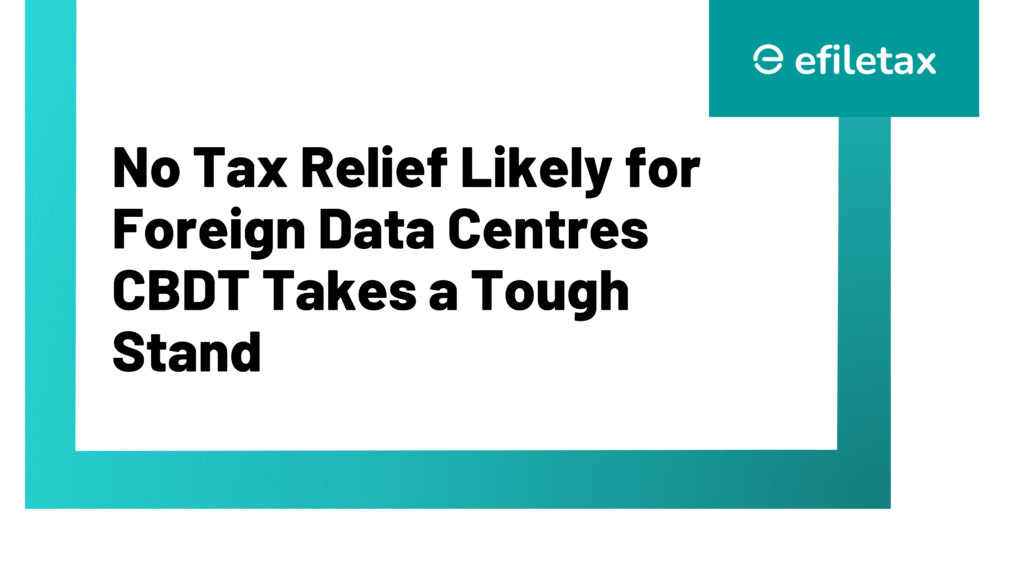
Will Foreign-Owned Data Centres Get Tax Relief in India?
Tax relief for foreign data centres may not be on the table anymore. According to recent clarifications from CBDT (Central Board of Direct Taxes), there is no active plan to provide concessional tax benefits to data centres set up in India by foreign entities — especially when profits are repatriated outside the country.
Let’s simplify what this means for businesses and how this fits into India’s digital infrastructure strategy.
What Did CBDT Clarify?
In June 2025, senior CBDT officials clarified during policy consultations that:
- India wants foreign cloud and digital infra players (like Google, Microsoft, Amazon) to set up data centres in India.
- But if these foreign players do not set up an Indian company (i.e., operate as a branch or via servers without a local subsidiary), they may not be eligible for tax reliefs or deductions.
- The idea is simple: no permanent establishment (PE), no tax relief.
🧾 Legal Angle: Under Indian Income-tax Act, 1961, business profits of foreign companies are taxed in India only if there is a business connection or permanent establishment (Section 9 read with relevant DTAA provisions).
Why Does This Matter?
Here’s what’s at stake:
| Concern | Impact |
|---|---|
| No tax benefits | Foreign cloud companies may pay standard tax rates (30–40%) on India-sourced income. |
| No infrastructure status | Without relief, they won’t get accelerated depreciation or cheaper funding. |
| India-first push | The government wants data localisation and Indian incorporation. |
What is a Permanent Establishment (PE)?
A PE is a fixed place of business in India through which a foreign enterprise conducts its operations. Examples:
- A branch office
- A server or cloud infrastructure physically located in India
- A fully owned subsidiary
Without PE, India can’t impose business tax on foreign entities — only withholding taxes apply on specific payments like royalties or technical fees.
CBDT’s Stand: No Relief Without Local Investment
The CBDT’s position aligns with India’s evolving tax strategy:
✅ Encourage local incorporation
✅ Promote Digital India & data localisation
❌ Avoid offering blanket reliefs to companies with no economic substance in India
This also echoes the global BEPS (Base Erosion and Profit Shifting) framework under OECD-G20, where taxation is based on economic presence, not just digital reach.
Expert View: A Missed Opportunity?
Some tax experts believe this may discourage FDI in digital infrastructure, especially when India needs massive investments in data centres, AI infra, and cloud computing.
However, others argue this is a push towards meaningful local presence, not just remote extraction of value.
Practical Tip for Foreign Players
👉 Set up a local subsidiary in India if you’re planning large-scale data or AI infra deployment.
👉 This enables eligibility for deductions, infrastructure status, and avoids complex PE litigation under Indian tax laws.
Related Legal Reference
- Section 9 of the Income-tax Act – Income deemed to accrue or arise in India
- OECD BEPS Action Plan 1 – Addressing the tax challenges of the digital economy
- CBDT Circulars & IT Department comments during policy sessions (2025)
FAQs
Q1. Will foreign-owned data centres be taxed in India?
Only if they have a permanent establishment or business connection in India. Otherwise, only specific withholding tax applies.
Q2. Can they claim infrastructure status like Indian data centre firms?
No. As per current clarifications, only Indian-incorporated entities qualify for such status.
Q3. How can a foreign company become eligible for Indian tax benefits?
By setting up a wholly owned subsidiary or joint venture registered in India.
Summary
Tax relief for foreign data centres may not be granted unless they establish a local entity in India. CBDT clarifies PE-based taxation will apply, encouraging foreign cloud players to incorporate locally.
Final Thoughts
India is at the cusp of becoming a global digital infra hub, but the tax policy will favour players who commit locally. If you’re a foreign investor or cloud business planning operations in India, make sure you:
- Register a local entity
- Understand the PE rules
- Seek professional tax structuring advice